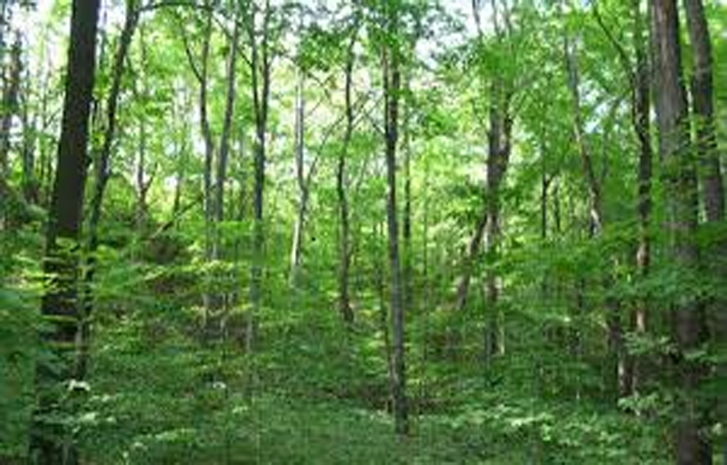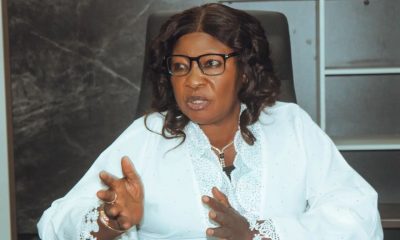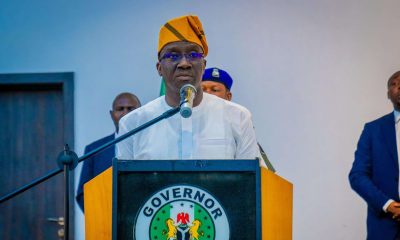Agribusiness
Nigeria to increase forest cover to 25 per cent as 6m hectares forested – Buhari
Published
4 years agoon
By
Seun Owope
President Muhammadu Buhari says Monday in Abidjan, Cote D’Ivoire, said Nigeria has successfully forested over 6,191,363 hectares of land through the green bond project.
A statement by the President’s media aide, Malam Garba Shehu, in Abuja on Monday, said the president was speaking at the Summit of Heads of State and Government 15th Conference of the Parties (Cop15) of the United Nations Convention to Combat Desertification (UNCCD), in Abidjan, Cote d’Ivoire.
According to the president, Nigeria is targeting to increase the nation’s forest cover to 25 per cent in line with global best practices.
Buhari noted that the 25 percent target was in fulfilment of a pledge at the 74th Session of the United Nations General assembly in September, 2019 of planting 25million trees toward achieving restoration of degraded forest reserves and other landscapes nationwide.
”We have also expanded protected areas by creating ten additional National Parks, including two Marine Protected Areas, cutting across the various ecological zones of the country.
“The operationalization of specific intervention programmes and policies in the country have further accelerated the implementation of the ongoing Ogoni Clean-up for restoration of polluted land as well as the implementation of the Great Green Wall programme hinged on ecological restoration and rehabilitation of degraded land.
”The National Agency of the Great Green Wall in Nigeria has made progress in land restoration of over Three Thousand Eight Hundred and Ninety-two hectares of land,’’ he said.
The president noted that his administration, in partnership with the World Bank, expended enormous resources to establish Agricultural Development Programmes in all the 36 States of the federation and the Federal Capital Territory.
“The ADPs operate the Training and Visit system of unified extension system covering the areas of Crop Production and Protection, Livestock Production and Animal Health, Fisheries, Agro-forestry and Gender related issues in Agriculture popularly referred to as Women-In-Agriculture.
“Furthermore, my administration is equally dedicated to fulfilling the pledge to the African Forest Landscape Restoration Initiative that seeks to restore 100 million Hectares of degraded and deforested landscapes by 2030 in response to the Bonn challenge.
“To date, the initiative has 128 million hectares in pledges from 32 African countries. In 2017, Nigeria committed to restore 4 million hectares of degraded forest landscapes under the AFR100 initiative.
”So far, over 555,480 hectares of land restoration have been recorded, including the planting of 15million tree seedlings covering over Twelve Thousand, Five Hundred Hectares of deforested lands,’’ he added.
On finance, Buhari said, domestically, Nigeria made efforts for funding a pipeline of projects in the path to a greener economy by issuing its first and second Sovereign Green Bonds.
According to the Nigerian leader, so far two rounds of the green bond have successfully been executed.
”The first round of the green bond amounted to $27.3 million, the second amounted to more than $41 million.
”We are currently on the verge of launching the third green bond to the tune of $68.7 million.
”Through the instrumentality of the green bond programme, innovative funding streams are being unlocked in order to finance environmentally and climate friendly projects with focus on both adaptation and mitigation,’’ he said.
The president reiterated Nigeria’s commitment to the various international treaties and obligations.
He said these include 2030 Agenda for Sustainable Development, the Global Forest Goals, United Nations Decade on Ecosystem Restoration and Post-2020 global biodiversity framework.
Others are the Paris Agreement on Climate Change, the Aichi Biodiversity Targets, and the 2021 Glasgow commitment to half deforestation by 2030 among others.
”However, it is worrisome to mention that finance stands as a major bottleneck in achieving these ambitious obligations and commitments within the timelines.
”Permit me to use this platform to once again appeal for the redemption of the pledges made by International Technical and Financial Partners to provide $19 billion as assistance to the Green Wall Member Countries to enable them meet their commitments,’’ he said.
The president called on the international community to pay more attention on the war between Russia and Ukraine, which would hurt the efforts of a more peaceful world and aspirations for a healthy society.
“Permit me to conclude by noting that, while we remain committed to global aspirations of a healthy and productive society, we cannot collectively tackle the problems of drought and desertification without a peaceful world.
“We therefore, call for a ceasefire and cessation of conflicts where they exist and especially the Russian – Ukraine war. We call on all the parties to return to the negotiation table with a view to putting an end to this needless conflict,’’ he added.
According to the president, Nigeria has also established a National Forestry Trust Fund aimed at improving afforestation programmes in the country.
He said the fund was also to ensure sustainable financing from non-government sources for the restoration of Nigeria’s forest estates and reserves and production of landscapes in order to achieve significant increase in forest cover.
“Nigeria, like other countries of the world, is not exempted from the several environmental challenges including creeping land degradation, desertification and drought in the Northern region, to wanton deforestation, land encroachment, invasion of coastal line, biodiversity loss, flooding and coastal erosion in the Southern region of the country.
“This sad reality reinforces Nigeria’s commitment to the United Nations Convention to Combat Desertification 2018-2030 Strategic Framework, geared towards mitigating the effects of desertification, land degradation and drought.
”It is therefore, imperative that Parties seize the momentum created by this conference to accelerate their commitments to achieving land degradation neutrality in order to restore the productivity of vast expanses of degraded land, improve the livelihood of more than 1.3 billion people and reduce the impact of drought in the affected regions,’’ the president said.
He noted that the theme; “Land, Life, Legacy: From scarcity to prosperity” was a clarion call to action for global leaders.
”To halt and reverse the three “Ds” planetary land crises of desertification, degradation and drought, as envisioned by the United Nations Decade on Ecosystem Restoration; and to restore lands, in order to fulfill food, water and energy needs.
“The international community must demonstrate enough political will and commitment towards the realization of the pledge to restore one billion hectares of land by 2030. This will, no doubt, save humanity from starvation and preserve the planet for future generations.
“Nigeria welcomes the UNCCD’s goal of land degradation neutrality through the Changwon Initiative which supports national voluntary target-setting processes in order to achieve its objective.
”To this end, Nigeria is demonstrating her commitment to its National Action Plan which is being implemented through National Policies, Institutional and Legislative Framework, Sectoral Programmes and Partnership Building that have been put in place to address the problem of drought and desertification.
“We utilize Public awareness programmes on causes and dangers associated with drought and desertification and also strengthen national and state institutions involved in drought and desertification control activities.
”Participation of Individuals and communities is also encouraged in viable afforestation and reforestation programmes through planting of tested pest and drought-resistant species of economic trees.’’
He said an early drought warning system that involves local people in designing, implementing and managing of natural resources conservation programmes for combating desertification and ameliorating the effects of drought had been put in place.
“Furthermore, we collaborate with development partners in areas of training, research, development and transfer of affordable and acceptable environmentally friendly technologies to mitigate drought and desertification.
”We have also revised our National Forest Policy in 2020 which is a remarkable improvement on the previous policy which had been in use since 2006. We also launched the National Strategy on Combating Wildlife and Forest Crime in 2022.
“The new policies are anchored on the need for continuous socio-economic development that will provide optimal benefits to the people and government of Nigeria in a sustainably managed environment.
“There are Forestry Programmes implemented by Forest Research Institute of Nigeria to tackle the problems of desertification through the establishment of woodlots, shelterbelts and windbreaks.
”Through these programmes, we were able to establish a Green Wall or Shelterbelt across the frontline States over hundred kilometers in width, stretching from the Northwest to the Northeast of the country,’’ he added.
The president thanked President Alassane Ouattara of Cote D’Ivoire, and people of Cote D’Ivoire, Secretary-General of the United Nations, Mr Antonio Guterres, and Executive Secretary of the United Nations Convention to Combat Desertification, Mr Ibrahim Thiaw and his team, for the organization of the event.
You may like


Nigeria Declares Readiness to Host 2030 Commonwealth Games


BREAKING: The Head of Service of the Federal Capital Territory (FCT), Grace Adayilo is dead


Nigeria, Switzerland begin talks on artefact repatriation and cultural cooperation


El-Rufai rules out 2027 ambition, Says He’s back to mentor youth, Support credible leadership


NMDPRA – Nigerians spend N1.3tn on petrol in June amid soaring energy costs


Pastor Adefarasin: Nigeria was born of British greed, Not God’s design
Trending

 Health1 week ago
Health1 week agoDeclassified CIA memo explored concealing mind-control drugs in vaccines

 Latest1 week ago
Latest1 week agoFubara pledges collaboration with APC lawmakers after Rivers by-elections

 Health7 days ago
Health7 days agoGroups launch ‘COVID Justice’ campaign, urge U.S. Senate to adopt accountability resolution

 Football7 days ago
Football7 days agoJuventus prepare €120m bid for Osimhen as summer rebuild plans gather pace

 News1 week ago
News1 week agoFamily demands coroner’s inquest into death of Chimamanda Adichie’s son

 Latest1 week ago
Latest1 week ago2027 race: ADC battles setbacks, arrests, internal strains as opposition fortunes waver

 News1 week ago
News1 week agoMother, son escape death as Lexus SUV overturns three times in Lagos

 Latest1 week ago
Latest1 week agoOkpebholo condemns attack on ADC members, vows to keep Edo peaceful

